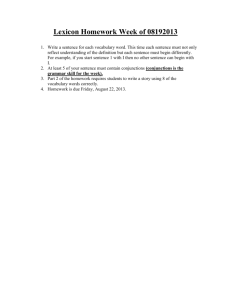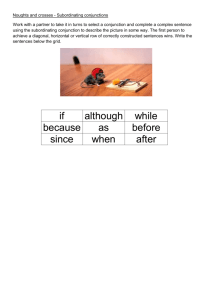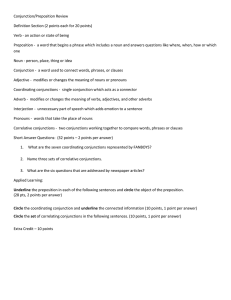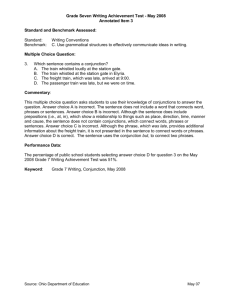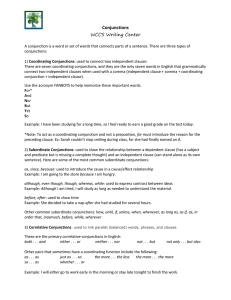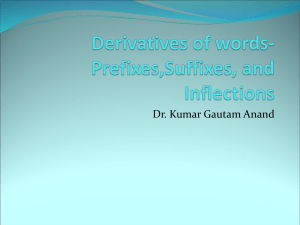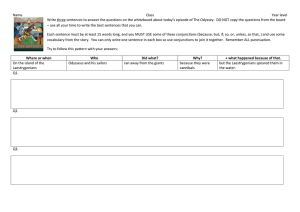Big Question:
advertisement
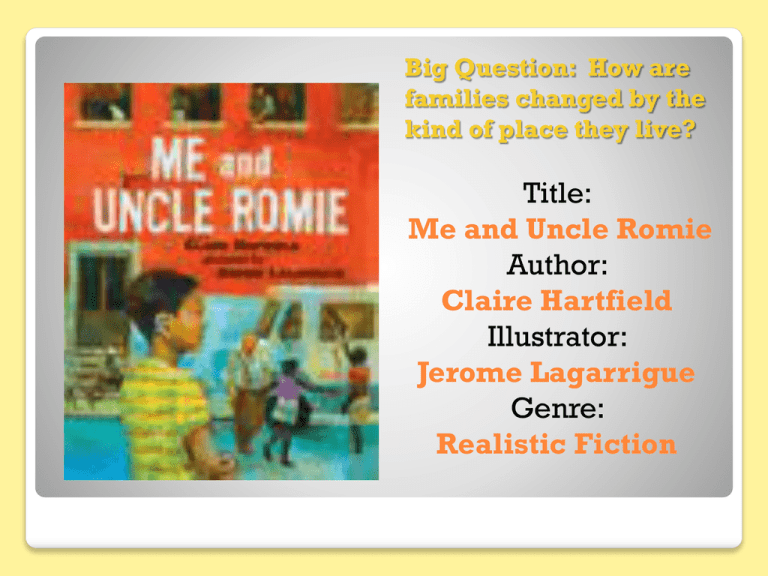
Big Question: How are families changed by the kind of place they live? Title: Me and Uncle Romie Author: Claire Hartfield Illustrator: Jerome Lagarrigue Genre: Realistic Fiction Small Group Timer rocky foolish rainy childhood selfish treatment movement neighborhood childish parenthood crunchy bumpy payment sleepy shipment assignment livelihood stylish environment guilty Spelling Words cardboard feast fierce flights pitcher ruined stoops treasure Vocabulary Words conductor conversations platform constellations counselors vendor More Words to Know Big Question: How are families changed by the kind of place in which they live? Monday Tuesday Wednesday Thursday Friday Monday Question of the Day How are families changed by the kind of place in which they live? Today we will learn about: Author’s Purpose Prior Knowledge Build Background Vocabulary Appropriate Phrasing Conjunctions Suffixes: -y, -ish, -hood, -ment Monday Build Concepts Fluency: Model •While I read “Country Kid, City Kid” to you, notice how I group words together instead of reading word-by-word. • Be ready to answer questions after the story. • Would you say the author’s purpose in writing this story was to persuade, inform, entertain, or express ideas or feelings? •What do you think the author means by “miles apart, but two of a kind?” Concept Vocabulary: constellations, counselors, vendor Found in City Changing Environments Found in Country Found at Camp Author’s Purpose Pages 244 – 246 Prior Knowledge: Take 2 or 3 minutes to think about what you know about the city. What do you KNOW? What would you WANT to find out? What have you LEARNED? After we read our story, we will add what we learned in the last column. Vocabulary Words cardboard –a stiff material made out of layers of paper pulp pressed together, used to make cards, posters, boxes, and so on feast – a big meal for a special occasion shared by a number of people fierce – wild or frightening flights – sets of stairs from one landing or one story of a building to the next Vocabulary Words pitcher –a baseball player who throws the ball to the catcher ruined –destroyed or spoiled something completely stoops – porches or platforms at the entrance to a house treasure – any person or thing that is loved or valued a great deal More Vocabulary Words conductor – a person who collects fares or tickets on a train or other public transportation conversations – discussions or talks between two or more people platform – a raised floor at a train station from which you can enter or leave a train More Vocabulary Words constellations – groups of stars that form patterns counselors – instructors or leaders in summer camp vendor – person who sells something or provides a kind of service (next slide) flights cardboard feast pitcher stoops treasure conductor platform constellations counselors vendor Monday Grammar: Conjunctions jeffs uncle lives in a city neighborhod Jeff’s uncle lives in a city neighborhood. his sister and him visits Uncle Jim every summer His sister and he visit Uncle Jim every summer. Grammar: Conjunctions Her voice sang soft and low. And is a conjunction. It joins two words, soft and low. Grammar: Conjunctions A conjunction is a word that connects words or groups of words. To add information, use the conjunction and. James played ball and listened to music. Grammar: Conjunctions To show a choice, use the conjunction or. could stay inside or play outside. To show a difference, use the conjunction but. He He had never played stickball, but he enjoyed it. Grammar: Conjunctions You can use a conjunction to combine two sentences into a compound sentence. Add a comma before the conjunction in a compound sentence. James had played baseball. He had never played stickball. James had played baseball, but he had never played stickball. Grammar: Conjunctions Find the conjunction in each sentence. New York is a huge city, but it has many smaller neighborhoods. New York is a huge city, but it has many smaller neighborhoods. Many artists and writers live in Greenwich Village. Many artists and writers live in Greenwich Village. Grammar: Conjunctions Find the conjunction in each sentence. Central Park has gardens, playgrounds, and a zoo. Central Park has gardens, playgrounds, and a zoo. You can see a play or a musical near Times Square. You can see a play or a musical near Times Square. Grammar: Conjunctions Find the conjunction in each sentence. It will take a long time to visit New York’s neighborhoods, but you will enjoy them. It will take a long time to visit New York’s neighborhoods, but you will enjoy them. Grammar: Conjunctions Choose the correct conjunction in each sentence. Harlem is in New York City, (or, and) it is an interesting neighborhood. Harlem is in New York City, and it is an interesting neighborhood. It is not a wealthy area, (or, but) it is a lively one. It is not a wealthy area, but it is a lively one. Grammar: Conjunctions Choose the correct conjunction in each sentence. Writers from Harlem wrote poems, songs, (but, and) stories. Writers form Harlem wrote poems, songs, and stories. Would you like to read a poem about rain(or, but) a story about jazz? Would you like to read a poem about rain or a story about jazz? Grammar: Conjunctions Choose the correct conjunction in each sentence. Writers from Harlem chose these subjects (or, and)others. Writers from Harlem chose these subjects and others. Monday Spelling: Suffixes -y, -ish, -hood, -ment rocky foolish rainy childhood selfish treatment movement neighborhood childish parenthood crunchy bumpy payment sleepy shipment assignment livelihood stylish environment guilty Spelling Words Tuesday Question of the Day How does James feel when he hears he’s going to stay at Uncle Romie’s and Aunt Nannette’s House? Today we will learn about: Context Clues Author’s Purpose Prior Knowledge Homonyms Vocabulary Conjunctions Suffixes: -y, -ish, -hood, -ment Tuesday Fluency: Fluency: Choral Reading • Turn to page 254. • While I read this page to you, notice how I group words together instead of reading them word-by-word. • Let’s practice as a class and read this page three times. Vocabulary Strategy for Homonyms Page 246 Me and Uncle Romie Pages 248 - 259 Tuesday Grammar: Conjunctions it was a rainey day, and we played baseball anyway It was a rainy day, but we played baseball anyway. i played in the outfield and catched a fly ball I played in the outfield and caught a fly ball. Grammar: Conjunctions A conjunction is a word that connects words or groups of words. To add information, use the conjunction and. To show a choice, use the conjunction or. To show a difference, use the conjunction but. Grammar: Conjunctions You can use a conjunction to combine two sentences into a compound sentence. Add a comma before the conjunction in a compound sentence. Tuesday Spelling: Suffixes -y, -ish, -hood, -ment rocky foolish rainy childhood selfish treatment movement neighborhood childish parenthood crunchy bumpy payment sleepy shipment assignment livelihood stylish environment guilty Spelling Words Wednesday Question of the Day What surprises James most about his stay? Today we will learn about: Author’s Purpose Prior Knowledge Fact and Opinion Develop Vocabulary Conjunctions Suffixes: -y, -ish, -hood, -ment Wednesday Fluency: Fluency: Paired Reading • Turn to page 260. • Take turns reading this page aloud. • Group words into appropriate groups and offer each other feedback. Me and Uncle Romie Pages 260 - 271 Wednesday Grammar: Conjunctions my mom spent her child hood in new york city My mom spent her childhood in New York City. she say it is busiest there than in north carolina She says it is busier there than in North Carolina. Grammar: Conjunctions A conjunction is a word that connects words or groups of words. Using conjunctions to combine words and phrases may avoid wordiness and repetition. Wordy: The day was hot. It was dry. Not wordy: The day was hot and dry. Wednesday Spelling: Suffixes -y, -ish, -hood, -ment rocky foolish rainy childhood selfish treatment movement neighborhood childish parenthood crunchy bumpy payment sleepy shipment assignment livelihood stylish environment guilty Spelling Words Thursday Question of the Day Have you ever traveled to a different city or state and seen or done things that reminded you of your life at home? Today we will learn about: More Vowel Sound in ball Online Reference Sources/Text Features Reading Across Texts Conjunctions Suffixes: -y, -ish, -hood, -ment Reading Online Pages 272 - 275 Thursday Fluency: Fluency: Choral Reading • Turn to page 276. • Choral read the poem “My Friend in School” three times. •Read with rhythm and appropraite phrasing. Thursday Grammar: Conjunctions her and me lived with our familys in new york city She and I lived with our families in New York City. on sunday, childrn feed the ducks and gooses in central park On Sunday, children feed the ducks and geese in Central Park. Grammar: Conjunctions Test Tip: You may be asked to choose the conjunction that makes sense in a sentence. Remember that and adds information, or shows a choice, and but shows a difference. Incorrect: You may go out, and you may stay at home. Correct: You may go out, or you may stay at home. Thursday Spelling: Suffixes -y, -ish, -hood, -ment rocky foolish rainy childhood selfish treatment movement neighborhood childish parenthood crunchy bumpy payment sleepy shipment assignment livelihood stylish environment guilty Spelling Words Friday Question of the Day How are families changed by the kind of place in which they live? Today we will learn about: Author’s Purpose Paraphrase Context Clues Conjunctions Suffixes: -y, -ish, -hood, -ment Understand the Question Friday Grammar: Conjunctions there is much trafic in the city, there is not much in the country There is much traffic in the city, but there is not much in the country. arent the city sights interesting to james and she Aren’t the city sights interesting to James and her? Grammar: Conjunctions A conjunction is a word that connects words or groups of words. To add information, use the conjunction and. To show a choice, use the conjunction or. To show a difference, use the conjunction but. Grammar: Conjunctions You can use a conjunction to combine two sentences into a compound sentence. Add a comma before the conjunction in a compound sentence. Context Clues You can use context clues to determine the meaning of unfamiliar words that are homonyms. Let’s look at some homonyms in our story. Context Clues: Find these homonyms in the story. Word saw watch down Context Clues Meaning Suffixes: -y, -ish, -hood, -ment Suffixes are word parts that are added to the end of a base word. healthy, foolish, childhood, enjoyment The word healthy has a suffix. What is it? The suffix –y means “having” or “filled with.” What do you think healthy means? The word foolish has a suffix. What is it? The suffix –ish means “similar to”or “having the quality of.” What does foolish mean? Suffixes: -y, -ish, -hood, -ment The word childhood has a suffix. What is it? The suffix -hood shows a state of being or belonging. What does childhood mean? The word enjoyment has a suffix. What is it? The suffix –ment means “the act or result of.” Suffixes: -y, -ish, -hood, -ment development babyish knighthood measurement lucky brownish entertainment squeaky The selfish boy will not share his crunchy food. The salty snack made everyone thirsty. When some people reach adulthood, they wish childhood were longer. Tim made the final payment on his stereo equipment. More Spellings for Vowel Sound in ball Mom said we ought to know better. We learned that the letters augh and ough can stand for the vowel sound in ball. Read the sentence to yourself. Raise your hand when you know which word has the vowel sound in ball. Which letters stand for the vowel sound? More Spellings for Vowel Sound in ball We hoped it was a home run, but the fielder caught the ball. Read the sentence to yourself. Raise your hand when you know which words has the vowel sound in ball. Which letters stand for the vowel sound? More Spellings for Vowel Sound in ball afterthought onslaught naughty overwrought fought daughter sought brought thoughtful taught slaughter distraught The selfish boy will not share his crunchy food. The salty snack made everyone thirsty. When some people reach adulthood, they wish childhood were longer. Tim made the final payment on his stereo equipment. Understand the Question What do you do when you have trouble understanding something you are reading? To answer a question about a reading selection, you must first make sure you understand the question. Look for key words in the question. Find words that relate to the key words. If the question asks you to describe something, look for descriptive words in the selection. Friday Spelling: Suffixes -y, -ish, -hood, -ment rocky foolish rainy childhood selfish treatment movement neighborhood childish parenthood crunchy bumpy payment sleepy shipment assignment livelihood stylish environment guilty Spelling Words Review Games Spelling City: Spelling Words Vocabulary Words We are now ready to take our story tests. Story test ◦ Classroom webpage, ◦ Reading Test AR ◦ Other Reading Quizzes ◦ Quiz # 58378
